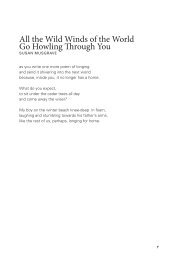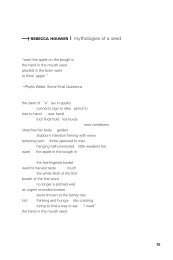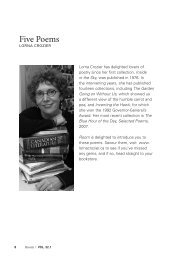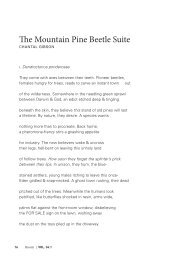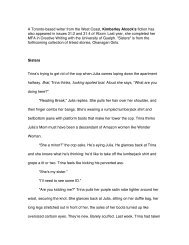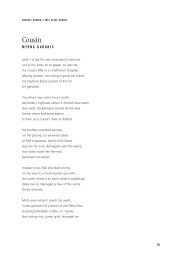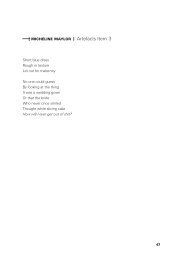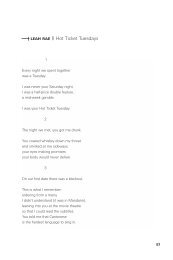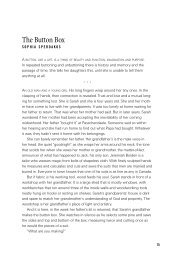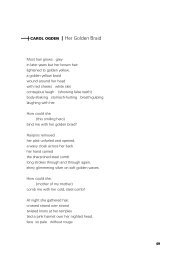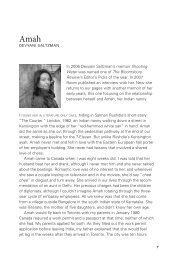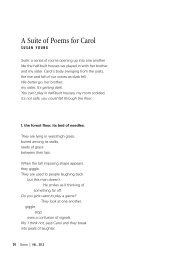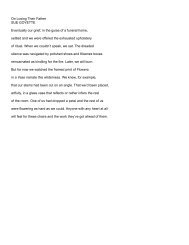First-place contest winner, fiction, Sophia ... - Room Magazine
First-place contest winner, fiction, Sophia ... - Room Magazine
First-place contest winner, fiction, Sophia ... - Room Magazine
Create successful ePaper yourself
Turn your PDF publications into a flip-book with our unique Google optimized e-Paper software.
CONTEST WINNER<br />
<strong>First</strong>-<strong>place</strong> Fiction<br />
SOPHIA SPERDAKOS<br />
The Meaning of Wheat<br />
“TELL ME ABOUT THE WHEAT” you wrote, and I took you at your word. I created texture<br />
and taste and smell for you. I lay down in the fields to feel the scratchiness<br />
of the grain against my skin and held a single strand between my thumb and<br />
index finger to describe to you the look of each kernel. I listened for the sound<br />
the crop makes when the prairie winds race from field to field, pressing against<br />
the stalks and creating the swaying rhythm of lovers in a dance. I reminded you<br />
of the noises and actions that accompany threshing and milling. I filled the allotted<br />
space for government-sanctioned messages with descriptions of the velvet<br />
sensation of flour against one’s skin. Cool and calming and clean.<br />
And in writing all of this I sought to suspend the future. The unwritten “what<br />
ifs” that I had no capacity to ask and you, in your sea of mud and despair, could<br />
not have answered. But the wheat has tricked me. For it has a meaning beyond<br />
itself. In describing it, I described myself. In detailing it to you, I raised the unfinished<br />
measure of our lives together and left myself more unsettled. There are,<br />
it would seem, no neutral topics.<br />
* * *<br />
THERE ARE THREE PARTS TO A kernel of wheat. The outer cover, the oily germ, and<br />
the protein-rich endosperm that makes up the bulk of the kernel. Each speaks to<br />
an aspect of the plant, its personality if you will. Yet seen from a distance a crop<br />
of wheat appears monolithic, as if there is only the whole, rather than a complex<br />
structure in every individual stock. When you saw me for the first time that<br />
morning at the train station did I seem any different from the other women who<br />
stood waiting to be claimed? Clustered together, as if physical proximity would<br />
protect us from the unknown world into which we were being catapulted. Does a<br />
man who orders a bride expect something unique or does he hope for uniformity<br />
so that he is relieved of the responsibility of choosing unwisely?<br />
I had your photograph. You stood apart from the other settlers as the stationmaster<br />
called out our names. Simon Richardson. Amelia Darcy. Men and women<br />
alike pretended to be different from the lowly born settlers who sent home for<br />
women to add warmth to their kitchens and their beds. We were better born,<br />
better educated. You, the second-born sons of first-born sons. We, the redundant<br />
daughters of comfortable families, voluntary exiles from a society of more unmarried<br />
women than men.<br />
7
Your jaw pulsed. I came to know that gesture well, as if it were reserved for<br />
me. Or is that one more thing about our relationship I simply imagined? As I<br />
stepped forward, I thought I saw the disappointment in your face. A man who<br />
expected more.<br />
“May I take your bag?” you said, your arm outstretched, not to me but to<br />
what I held.<br />
“If you like,” I replied, knowing you would feel the dampness of the handle<br />
from the sweating of my hand.<br />
We joined the other couples at the preacher’s house. His wife had set out<br />
three small towels and a hard homemade soap. Somewhere in my bag was a<br />
single bar of lavender that my mother had given me. Her idea of preparing me<br />
for my future. It seemed ridiculous to take it out. I shared the towels with five<br />
other girls. We washed our hands and faces in a basin of cold water, the last of<br />
us replacing our own dirt with that of the women who came before. The preacher’s<br />
wife was silent, but as we finished our modest preparations she said, “I hope<br />
you are realistic girls. I hope you are believers. You will need to be both.”<br />
By midday I was your wife.<br />
8 <strong>Room</strong> of One’s Own VOL. 25:3<br />
* * *<br />
THE OUTER COVER OF THE WHEAT IS the bran, the most fibrous part. I think of it as<br />
the most serviceable. When ground with the rest of the plant it makes the flour<br />
coarse, darker, less silky. It is useful, but not elegant or refined. Before I left<br />
England I was given a coat by a woman who had returned from Canada for<br />
good. Her mother knew mine, and together they sent her on a mission to<br />
dissuade me from going.<br />
“The land is frightening. There are no trees, no bushes, no houses, nothing to<br />
see. It is like being blind. It is as if you have lost your memory. There is no one to<br />
talk to except your husband, who has nothing to say. There is nothing to read.<br />
There is no music, only the wind, and there is no entertainment, only work.”<br />
I listened and said nothing. In England I was the spinster daughter, maiden<br />
aunt, childless woman. In Canada, I might be someone else.<br />
“Thank you for the coat. I’m sure I will be glad of it.”<br />
“No, you won’t. You will hate its shapelessness. You will find the wool scratchy<br />
and the colour as drab as the frozen earth in February. I’m glad to be rid of it.”<br />
She was right, of course. I do hate the coat. It is my outer cover, by which I<br />
am judged.<br />
Simon and Amelia. We married without romance, with only the knowledge of<br />
each other we exchanged in one letter each. You wrote, I am 28 years old, 6 feet
SPERDAKOS<br />
The Meaning of Wheat<br />
tall, with brown hair and blue eyes and have lived in Canada for three years. I am<br />
in good health and require a woman who is too. I replied, I am 27 years old, 5<br />
feet 5 inches. My hair is also brown, as are my eyes. I am in good health and<br />
will do my best to remain so. I am able to cook and am not concerned about<br />
hard work.<br />
We left the other couples and drove in a wagon for three hours, saying little.<br />
I watched your hands on the reins, long almost delicate fingers, lightly freckled<br />
from the sun, scratched and callused and rough from hard work.<br />
“Do you mind?” I asked, unaware I had spoken aloud.<br />
“Mind what?”<br />
“The calluses?”<br />
He looked down.“They’re like everything else here. Unavoidable.”<br />
“You sound resigned.”<br />
“It was not entirely my choice to come.”<br />
‘Why?”<br />
“Sometimes we are presented with options that are really decisions. My elder<br />
brother inherited our family estate. I was used to an allowance. Its continuation<br />
was conditional upon my coming to this <strong>place</strong> at the far ends of the earth.<br />
Look around this prairie and you will find the second sons of England in plentiful<br />
supply.”<br />
“Why do you stay?”<br />
“I cannot bring myself to admit defeat. And I don’t want to give up the<br />
allowance.”<br />
“And me?”<br />
“It is difficult to manage everything alone.” He paused. “Do you mind?”<br />
“Mind what?”<br />
“Not being wooed.”<br />
I laughed, the sound of it startling the horse. “No, I don’t mind.”<br />
* * *<br />
THE OILY GERM OF THE WHEAT is the future. It is the part of the kernel from which<br />
the new plant springs. But it is delicate and does not always survive to produce<br />
another crop. The outer cover may protect it for a while, but it is vulnerable<br />
nonetheless. I tried not to let you see that part of me. I was supposed to help you<br />
manage. You had made that clear. We lived together, and apart, in the small oneroom<br />
house you had built: living area, sleeping corner, cooking area and desk for<br />
doing accounts. One bed. We lay side by side, consciously not touching, each so<br />
9
unmoving that morning would find us secretly rubbing a stiff neck and back.<br />
And we worked. From the hours before dawn, when the early summer air was<br />
sweet and gentle, until long after dark, when we fell back into bed, our backs<br />
sore again, this time from bending and plowing and hoeing. Our minds drowning<br />
in thoughts we did not share.<br />
I was not lying when I said wooing was not important, but I was ill prepared<br />
for your separateness, for the sense that you were here temporarily, waiting for<br />
some sign that you should go. One evening at dusk, when we had been married<br />
for six months, I found you standing by the horse, your hand tangled in its mane,<br />
your body taut as if poised for flight.<br />
“Simon . . . ”<br />
“Amelia, do you miss England?” How seldom you used my name. As if to<br />
identify me was to claim me. I stopped at the sound of it, liquid, almost a whisper,<br />
and felt the first stirring of hope, perhaps longing.<br />
“I miss some people and I miss the spring rain, but no, I do not miss England.<br />
I was made to feel unnecessary there. It would be wrong to miss such a <strong>place</strong>,<br />
don’t you think?”<br />
You didn’t reply, as if my voice were merely the wind that rustled the growing<br />
wheat. I thought I had insulted you, but that night you turned to me in our lonely<br />
bed and laid your hand on my breast.<br />
“Speak to me,” you said, as if the rhythms and cadences of my voice would<br />
transport you to that <strong>place</strong> for which you longed.<br />
“I am afraid.”<br />
“So am I.”<br />
Did I think it would be better for us after? That the intermingling of limbs<br />
and scent and sighs would change the rhythm of our days, the isolation of our<br />
thoughts? I had not thought to fall in love. To look up from milking a cow or<br />
churning butter or tending to the garden and feel my breath leave me at the sight<br />
of you crossing from the barn to the house or wiping the sweat from your forehead.<br />
To need to position myself where you might have to touch me as you<br />
passed. In each season, to implore the wind and rain and snow and crop to<br />
cooperate so you would lose that look of impermanence and want to stay here<br />
with me.<br />
But though you were with me in the fragile cocoon of the nights, you<br />
retreated when the dark gave way to dawn. Even more so in our second year<br />
together when I told you I was carrying your child. Was it panic I saw deep in<br />
your eyes, their light blue becoming cobalt with a vision of the future you had<br />
10 <strong>Room</strong> of One’s Own VOL. 25:3
SPERDAKOS<br />
The Meaning of Wheat<br />
not anticipated? I wanted to tell you that a child born of this <strong>place</strong> might connect<br />
us to the land, a rooting of our feet and dreams here, where the sky is endless<br />
and the possibilities limitless. But before I could say it, before I could make you<br />
want this link between us, it was gone, spilling out from between my legs one<br />
morning as I stood braiding my hair. In the days that followed you comforted me,<br />
but you did not tell me there would be other babies. And although, in the months<br />
before you left, you came to me in the night, you did not try to replant what we<br />
had lost.<br />
* * *<br />
THE NUTRITIOUS ENDOSPERM IS LARGER than the rest of the kernel. The foundation of<br />
any flour. Resilient. On a blistering summer day, when the fields buzzed with the<br />
sound of crickets, and the wind was hot against the skin, the word came.<br />
“Simon, what has happened?”<br />
“England and Germany are at war. Armies are mustering. They’ve called for<br />
volunteers.”<br />
“I am glad we are away from such madness.”<br />
“Amelia, many of those enlisting are English. I have to go.”<br />
I watched your face, the pulse in your jaw rapid, hard.<br />
“Have to or want to?”<br />
“It will be over in a few months and I’ll be back. I’ll arrange for help with the<br />
harvest and be back by Christmas.”<br />
“How lucky for you, Simon. A reason for you to go, to abandon this farm, to<br />
get away from me . . . ”<br />
“Stop it.”<br />
“Stop it? Look at me and tell me I’m wrong.”<br />
“I don’t have to justify this. England is at war. It’s what men do, Amelia.<br />
They fight to protect what they believe in.”<br />
“Canada, Simon? Me? Are we what you will fight to protect? We are your life<br />
now. Have you forgotten?<br />
“I’m sorry, Amelia. I will be back, but I have to go. I won’t be left out.” You<br />
turned from me then, already seeing another <strong>place</strong>, but I called you as a voice in<br />
a dream pulls you away from your chosen direction.<br />
“Go, then. Prove to your brother that you are not the lesser man because of an<br />
accident of birth. Perhaps he will die and you can take on the life you think would<br />
be so much better than the one you have here, with a barren wife no one else<br />
wanted.”<br />
11
The words circled over me and penetrated my pores. They lingered like fine<br />
dust, their impact felt in the corners of my mind as I tried to close them out.<br />
You went, of course. You left me on a morning when the sky was the colour<br />
of cornflowers and the wheat was strong and sure. I think you saw the beauty of<br />
the land, and I hoped it would brand itself on your eyes when you rode away.<br />
I stood outside the house as you came up behind me and pulled me back<br />
against your chest, your arms wrapping around my waist. I was rigid with anger<br />
and should have pulled away, but you had calculated well that my body would<br />
respond.<br />
You put your mouth to my ear and whispered, “I promise I will come back,”<br />
and released me. The warm breath caught me off guard, my body betraying my<br />
resolve to remain still. Before I could speak you had mounted and ridden away.<br />
“Why?” I whispered. “Why will you come back?”<br />
* * *<br />
SOMETIMES A STORM WILL COME out of the sky that can be seen for miles. This first<br />
spring since you left I looked out one morning at the new plants beginning to<br />
rise from the ground and knew complete helplessness before a force I could<br />
not control. The sounds of thunder and lightening deafened me, and I watched<br />
as the wheat was pummelled beneath hail that crushed the kernels beyond<br />
recognition. When it was over the wheat lay trampled. No outer cover,<br />
no oily germ, no endosperm.<br />
And in a muddy <strong>place</strong> that my imagination cannot conjure, you lay trampled<br />
under the feet of your battalion as they retreated. Forever unaware of the fury and<br />
blinding light that filled the sky around you. Were you granted a last flash of<br />
clarity before you died, a moment of knowing what your future would have held?<br />
I hope not. I hope so.<br />
If I could have spoken to you in your last moments I would have reminded<br />
you that sometimes the wheat surprises us, is hardier than it looks. In the<br />
trampled remains a few stalks survive and produce more. And sometimes,<br />
in a woman’s body, a tenacious seed takes hold.<br />
12 <strong>Room</strong> of One’s Own VOL. 25:3



